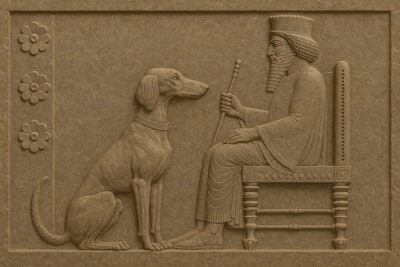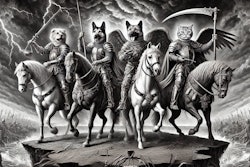
In early June, Iranian officials expanded a ban on walking dogs in public, which had previously only applied to the capital Tehran, reported the BBC. The public dog walking ban now includes at least 18 other cities. Automobile transport of dogs was also made illegal.
Iranian politicians and clerics regard pet dog ownership as contrary to the teachings of Islam. Many traditional Muslim scholars consider dogs as religiously unclean, except for herding, hunting and security. Iran's Ayatollah Ali Khamenei described dog ownership as "reprehensible,” according to the BBC.
Petting dogs or especially coming into contact with their saliva may be viewed as ritually impure in Islam. Yet, views toward dog ownership have been changing throughout the Muslim world, even its Saudi Arabian heartland.
Iranian politicians and clerics have decried this change in attitudes toward dogs as European and American cultural influence. However, Iran has an ancient tradition of pet dog ownership dating to long before the Prophet Muhammad founded Islam.
Dogs in ancient Iranian society
In pre-Islamic Iran, dogs were not only companions and helpers but also held deep religious and moral significance, especially in Zoroastrian thought. In Zoroastrianism, dogs dual role as sacred beings and working animals gave them a unique and honored place in ancient Iranian society.
Zoroastrianism, a monotheistic religion that emphasizes the struggling dualism of good and evil, was the dominant religion of pre-Islamic Iran. Religious persecution drove many Zoroastrians from their homeland in Iran, but the religion survives.
During Iran’s Achaemenid (c. 550–330 BCE) and Parthian (247 BCE–224 CE) periods, dogs occupied a revered place in Zoroastrianism.
In Zoroastrian though, Dogs were believed to ward off evil spirits, especially at the time of death, according to Encyclopedia Iranica. Zoroastrian funeral rites included the Sagdid ritual (literally “seen by the dog), in which a dog, preferably one with two spots above the eyes, was brought before the corpse to purify it and frighten away evil entities.
Religious texts like the Vendidad, part of the Zoroastrian scriptures, emphasized the importance of treating dogs with care and condemned cruelty toward them. Killing a dog was considered a sin in some cases.
Dogs were considered to be helpers of Ahura Mazda, Zoroastrianism’s supreme being. They were seen as creatures aligned with the forces of good, aiding in cosmic order, and deserving of respect and care.
Even before the Prophet Zoroaster founded his namesake faith, dogs had a role in Iranian society. Depictions of dogs on pottery found in Iran date back 10,000 years, according to a study published in the journal Paleorient. The dogs looked remarkably similar to modern Salukis.
Throughout Iranian history, dogs have played a role. Although more recent religious thought has turned against pet dogs, canine companions were once welcomed and revered in Iranian society.



















